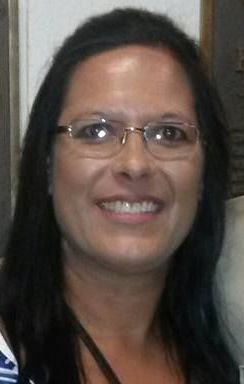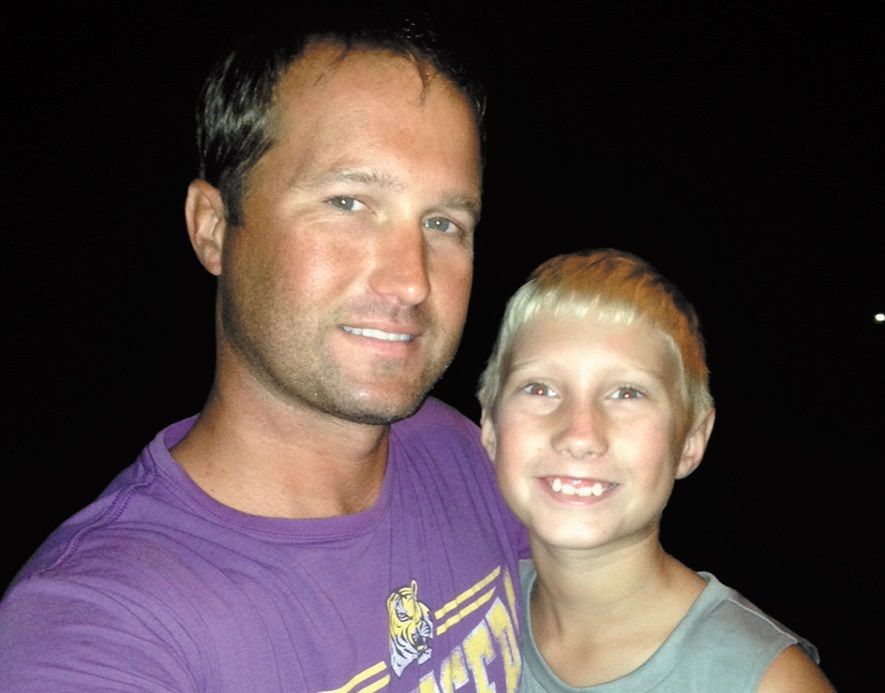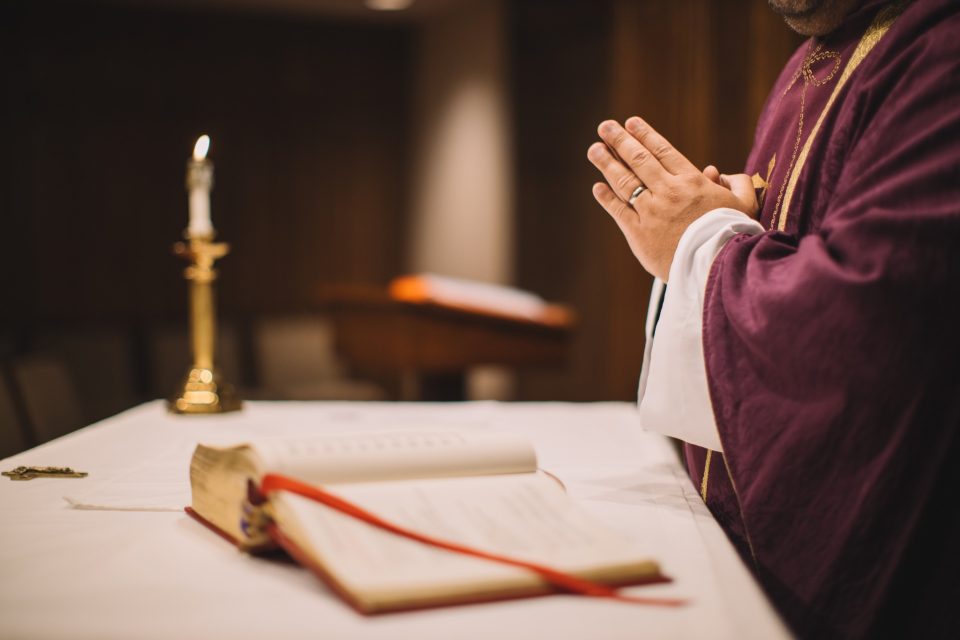
Bishop counsels faithful on same-sex marriage participation
August 1, 2015
Bonvillain apologizes, but fails to meet with local NAACP head
August 5, 2015Call them lucky.
They struggled in the vast waters of Terrebonne Bay, two men and a 10-year-old boy, kicking and calling out with only angry, gale-driven waves to hear them.
Rescuers located the sinking boat the trio was forced to abandon, but still had a challenge ahead, fearing that once night fell finding the stranded boaters themselves might be impossible.
As wind and waves conspired to claim them all for Neptune, a different kind of conspiracy – from the helping hands of Terrebonne Parish deputies, firefighters and paramedics – helped ensure that a happy ending prevailed.
Chris Cason, who had skippered the ill-fated 19-foot Fishmaster, his friend and co-worker, Edwin Ensign IV, and son, Edwin V, were located and safely brought to a Cocodrie dock.
Rescuers and the rescued agree that the ordeal was a life-changer.
And it provided lessons for future caution and survival that none will forget.
“If my dad didn’t have his phone we wouldn’t have been safe,” said little Eddie, admitting that he had been “a little scared.”
SMOOTH LIKE GLASS
The miracle that could have been a tragedy occurred Thursday forecast to be an average summer day weather-wise, with temperatures around 93 degrees and a potential for rain later in the day.
At Johnny Glover’s Coco Marina in Cocodrie employees of TEAM Industrial, a global service company based in Geismer, had gathered – some with family in tow – for a fishing retreat. Many, like Chris Cason, brought their own boats. Edwin brought Eddie, as well as wife Beth and 10-year-old daughter, Madison.
The three adults and two children zipped around waters off Terrebonne’s eroding coast, hooking speckled trout all morning.
They returned to Coco Marina for a late lunch; Beth headed back to Tangipahoa Parish with Madison, who was still beaming from her first fishing trip.
“Everyone had a blast,” Chris said.
Chris, Edwin and Eddie ventured into the water again, for an evening trip. The gleaming white Fishmaster and its 140 hp Suzuki outboard carried them out toward Wine Island Pass, an ever-widening swath of water that is a gateway from Louisiana’s inshore waters to the Gulf of Mexico, straddled by deteriorating barrier islands.
“The water was smooth like glass,” Edwin recalled.
As Chris, Edwin and Eddie made memories around the Terrebonne barrier islands in the water, Beth and Madison headed toward their Tangipahoa home on the highways, enduring a spate of rain and wind for a period of the 100-mile plus trip.
CHAOTIC CONDITIONS
While no severe weather advisories were issued, the National Weather Service in Slidell had stated in a 2:40 p.m. update that “scattered showers and thunderstorms” were pushing southwest through southern Mississippi and into southeast Louisiana. The storms, the update said, could be strong to severe “with the main concern being in the form of strong to damaging wind gusts, frequent cloud to ground lightning, and brief torrential rainfall.”
When Beth pulled up to her home she saw that the family’s trampoline was missing, a victim of one of the tiny cells of bad weather popping up on the radar maps.
She called Edwin at 5:10 p.m., telling him she had made it home and complaining of the missing trampoline. A bad storm was moving through and was headed south, she said.
The skies above him were blue, but Edwin checked the weather radar on his iPhone, and saw a ragged blotch of green with yellow and red specks moving in from the north.
“He said, ‘We need to get the heck out of here,’” Chris said. “Then we looked up and saw it way in the distance, coming our way. The sky didn’t get dark until we got out into the bay.”
Edwin’s phone was locked inside a LifeProof protective case, something he had bought just a few weeks before. Billed as shockproof and waterproof, the case proved difficult for him to use at first. But he was acclimating to it.
Chris gunned the boat’s motor and headed northward.
As if on cue, the seas began to build as strong wind gusts huffed over the water.
Robert Ricks, the lead NWS forecaster in Slidell, later observed that there could be no doubt the trio was in a perilous situation.
“When these conditions come out of the north they usually have quite a bit of umph to them,” Ricks said. “And if you are out on the water anything from the north limits your access back. It gets pretty chaotic with these situations and downbursts can make the winds quite erratic.”
WHITECAPS ALL AROUND
Chris, Edwin and Eddie didn’t need a weatherman to tell them how the wind blew.
Within minutes their trip had gone to hell.
“The wind was on the front side of it and started to blow and the water all began to get crazy,” Chris said. “We both knew that with a 19-foot boat in that big open water it was going to be rough.”
The farther north the trio traveled, the closer the storm came, and the harder the winds blew, confusing the surrounding seas, building the rapid chop to four, then five feet, slamming the vessel from all directions.
“There were whitecaps all the way around and no matter which direction Chris tried, whatever way he faced the bow it was pointing at waves,” Edwin said. “There was no right way to go all around … I was on the bow, trying to hold the front of the boat down, putting all my weight on the front. I was looking way down to see the bottom of the water. Then I looked behind me and there was water in the boat, a foot of water, and I slid off the front trying to figure how to get the water out of the boat.”
The height and force of the waves threw sheets of water over the transom and the motor, bogging down the rear end. The Fishmaster had a bilge pump but there was no way for it to keep up.
“The second I got to the back, a big wave hit us from the side and the motor died,” Edwin said. “Chris went to the front and got our life jackets out, my son already had his on.”
Little Eddie was frightened and began to holler that he wanted to get off the boat. The two men saw that the stern was starting to go under, lifting the bow and causing their possessions to slide downward.
Chris lost his phone. Their ice chest slid out of the boat and disappeared in the maelstrom.
Waves mercilessly punished and pounded as Edwin felt around for the anchor line, something that they could hold onto while remaining with the vessel. It was too tangled at that point to retrieve.
MARINE WARNING
Chris grabbed Eddie and bailed over the side with him, as Edwin groped around in the front, seeking the dry box that held emergency supplies. The boat foundered and then rolled as Edwin made his escape, unable to see anything but sheets of waves as he kicked his way toward his friend and his son, eyes stinging and throat burning from the salt.
As waves lifted and dropped him, Edwin found the iPhone in its waterproof shell and tried to call for help, but there was no voice signal.
At 5:49 p.m., he tried to text company friends he presumed were back at Coco Marina, but got no response.
“I was trying to get in touch with the people we were with because they knew where we were,” said Edwin. “I yelled at Chris and told him I couldn’t get in touch with anyone.”
Eddie called out to his father.
“Did you try 911?”
So, Edwin pressed the emergency digits.
“I swam closer to Eddie and Chris and gave them the dry box and kept trying to get something out, but I didn’t know exactly where I was. I looked at the map on the phone and saw we were in the center of Terrebonne Bay, we were right at the “T” in Terrebonne.”
Up in Slidell, forecaster Tim Destri, relying on Doppler, reflexivity and algorithm output from his NWS systems, issued a Special Marine Warning for coastal waters from Port Fourchon to the Atchafalaya River, including Terrebonne Bay, at 6:06 p.m.
The warning indicated that winds forward of the thunderstorms could exceed gale force, as high as 40 knots or 46 mph.
Edwin, Chris and Eddie already knew.
“The waves were coming so fast even the life jackets we had on were not allowing us to reach the top of the waves,’ Chris said. “We were going through the waves as they came, and the waves were capping over the top of us.”
ALL HANDS ON DECK
Edwin remained a distance from Chris and kicked with his feet while keeping his arms as far above the crashing waves as possible, continuing to text.
The messages did find their mark.
At the Terrebonne Parish Communications District offices, operators routed the information to a Sheriff’s Office dispatcher, who called Water Patrol Lt. Mike Ledet.
Ledet was at the Sportsman’s Paradise restaurant, picking up a tea when he got the call. His boat, as usual, was docked at the Louisiana Universities Marine Consortium, a short distance down the road.
“I got in my truck and headed to LUMCON,” Ledet said. His partner, Sgt. Dakota Fitch, also responded, blue lights flashing.
Fitch called Little Caillou Fire Chief Marty Thibodeaux, who was at a training session in Montegut with Battalion Chief Pat Smith, and the firefighters rushed toward LUMCON as well.
Thibodeaux’s sister, Mona Blanchard, who was preparing for a quiet night at home, dropped what she was doing and headed to Little Caillou Station 3, and drove the department’s rescue truck to the staging area, red lights blinking and siren warbling.
Ledet and Fitch boarded their navy-blue patrol boat and, as they prepared to leave.
Thibodeaux and Smith showed up.
“We got on board and I told Pat, ‘I want you to watch straight in front of the boat so we don’t run over them,’” Thibodeaux said.
Ledet focused on the boat’s Lorance system and on the wheel and throttle as it bounced over the chop. While Smith kept watch on the bow, Thibodeaux looked over the starboard and Fitch the port side.
“It was important that we had everyone there, that we had the help, because it’s that many more sets of eyes,” Ledet later said. “We needed all hands on deck.”
As the rescue boat headed farther out, the waters got rougher. Ledet steered to what the 911 system said were likely coordinates from cell information they received.
About 25 minutes into the trip they spotted the nose of the Fishmaster, with only four feet of the stricken vessel sticking out of the water.
FINS IN THE WATER
The Louisiana Department of Wildlife and Fisheries had dispatched agents to Terrebonne Bay and a Coast Guard helicopter crew was scrambling in New Orleans. Acadian Ambulance responding to LUMCON, where they joined Mona Blanchard and other Little Caillou paramedics waiting at the dock.
Out on the water, the officers and the firefighters continued scanning the waves.
“From the point of where the boat was, I tried to figure which way the wind and the current were taking them,” said Ledet, who pressed on with the search.
“The tide was going out,” Edwin said. “Where I had seen us on the ‘T’ in Terrebonne at one point, I later saw that we were below it, traveling with the outgoing tide. The sun was going down.”
Chris said his first priority was seeing to the safety of Edwin’s son.
“Eddie was holding on to my shoulder but that was making it too heavy for the life jackets, so the waves were just beating us up,” Chris said. “He held my arm and we were just holding on to each other.”
Eddie peppered Chris and his father with questions and they tried to be patient, giving reassuring answers they hoped would not prove to be lies. Dark would come soon. The flares in the dry box were soaked.
“Are we going to have to sleep out here?” Eddie asked.
“No,” Chris said. “People come through here all the time.”
“Are they going to find us?” Eddie asked.
“Soon, someone will be here soon” Edwin said.
“Are there sharks here?”
“No,” Chris said. “No, they’re all out in the Gulf.”
In the distance they saw blue lights, and blasted hand-held air-horns. The blue lights got smaller, as the boat traveled farther away.
“They were coming straight at us and then, at 100 yards, they just took a hard right and took off,” Chris recalled.
The chop began to ease and Eddie called out that he saw what looked like dolphins.
“I didn’t want to look,” a tearful Edwin later said. “I didn’t want to see. I didn’t want to see what kind of fins they were.”
Ledet said his concern was increasing with the darkening of the skies.
“We kept having to slow down, to listen and to look,” Ledet said. “It was coming close to dark and while it was dangerous for them to begin with, in the dark we could have run over them.
After we found the boat, we went back north a couple of miles. Then we turned around and headed south again. Marty said he heard something the way the current was going and the way the boat was drifting I made a turn, then went back a little beyond the boat, maybe a half-mile from it.”
SAFE ASHORE
After seeing the blue lights again draw close, the trio set up another racket. Ledet guided the vessel toward them and tried to keep it steady, nose to the wind, in the still-rough waters, as Fitch, Thibodeaux and Smith reached out, first grabbing Eddie, then Chris and then Edwin.
“One guy got each arm and the other person reached up and grabbed each of them by their pants,” Thibodeaux said. “That was good because with swimmers there is nothing to grab, you’ll just rip the clothes. With boaters they have belts and clothes and there is something to grab, it’s like they have handles.”
Chris and Edwin admitted to the rescuers that they were at their last.
“We were spent, we had nothing left, our energy was gone” Chris said. “The first thing out of my mouth was, ‘I want to know the names of everyone on this boat and I want to give everybody a kiss.’”
Although they had ingested water and were fatigued from 90 minutes of kicking in the waves, Acadian paramedics found the trio in overall good health.
Tired from the stress of the search but satisfied that they had gotten the job done, the rescuers went their separate
ways. Chris, Edwin and Eddie were taken to Coco Marina by co-workers who had gathered at LUMCON.
Blanchard went back home, just in time for airing of the “Big Brother” reality television show, which she tries not to miss. Thibodeaux and Smith returned to Montegut; Ledet and Fitch resumed patrol.
LESSONS LEARNED
“They did a lot of things right,” Ledet later said, recounting elements that can be of help to all boaters. “The big right thing they did was they put their life jackets on. If they didn’t have the life jackets, one of those waves would have brought them under, or when one of those waves came over, they might have inhaled. But when they knew the bad weather was coming, they should have gone to the island right there and waited it out. That’s what I would recommend people do.”
Eddie went back to playing with his Xbox game system once his father brought him home, and now prepares for a new school year, hoping to again excel in mathematics.
Edwin said the experience has taught him to look more carefully at the weather, but most of all he plans to attach safety devices like whistles, lights or glow-sticks to life jackets he and his family will use any time they go out on the water.
As he prepared to bring his boat back to Tangipahoa Saturday, Chris said he was grateful for the items in the dry box. SeaTow had picked up the vessel, pumped the water out and taken it to the dock. The submerged motor is not likely to run again.
A marine radio, Chris agrees – particularly one with a marine weather alert – might have helped by aiding communications.
Ledet is grateful that he had so much help, and credits Fitch with fast thinking for calling the fire department.
But most of all he is glad that the mission was a success.
“It was all teamwork, all of us together,” Ledet said. “I’m just glad I could do something. Helping people is what I like doing.”
The full impact of the ordeal came to Edwin in waves as the week wore into the weekend.
“I thank God for all of them,” he said of the rescuers.
Edwin Ensign IV and his son, Edwin “Eddie” V, taken after arriving home in Tangipahoa Parish following their
rescue from Terrebonne Bay.
















